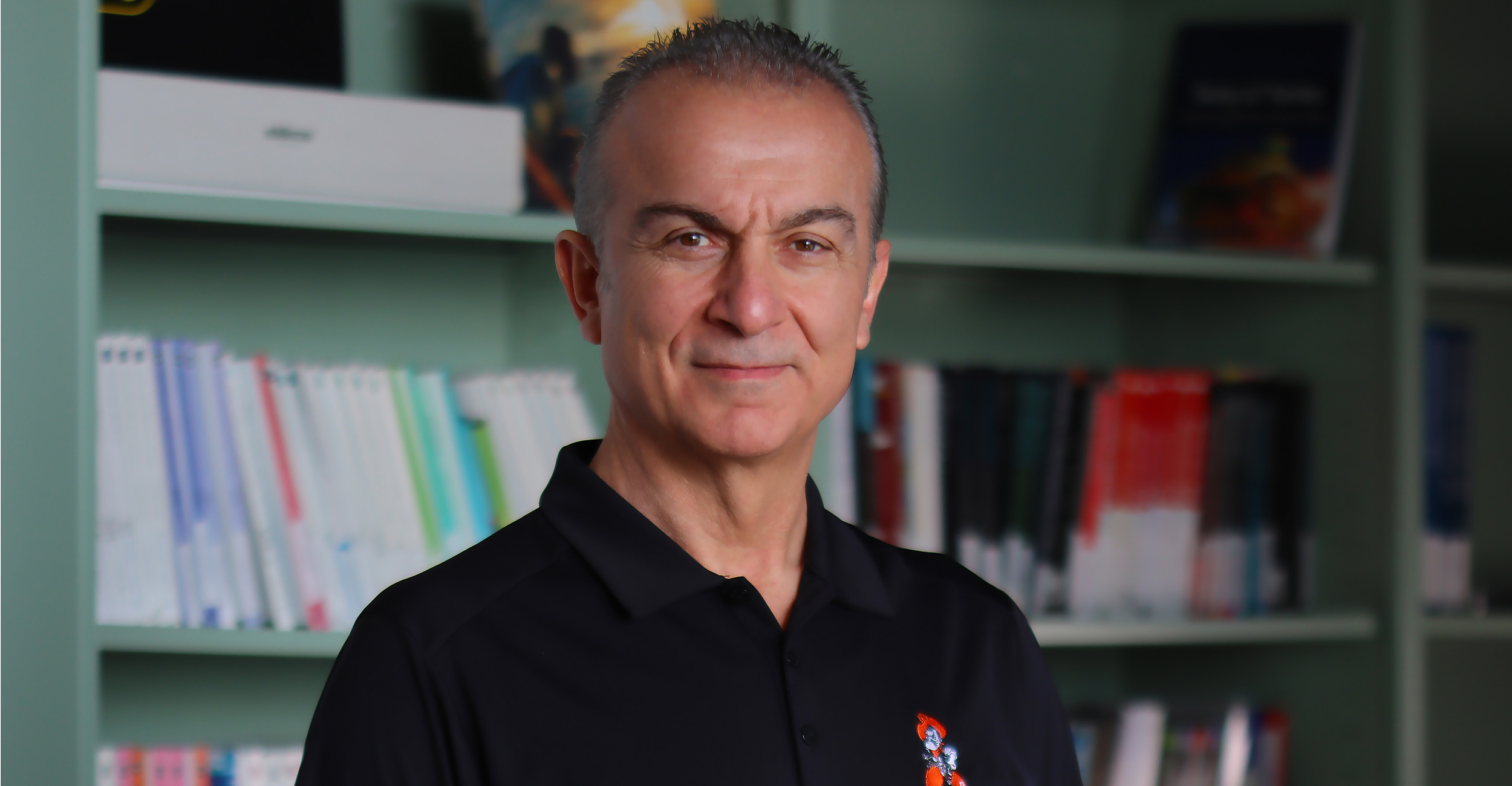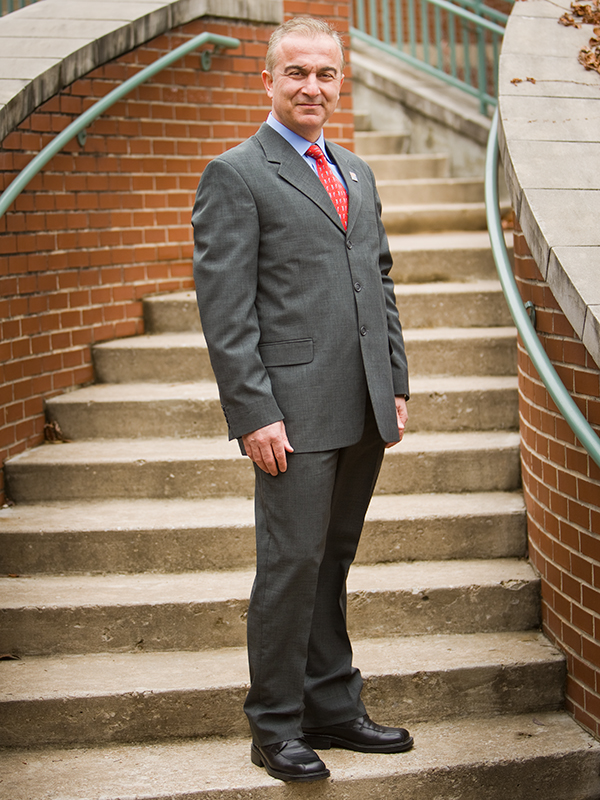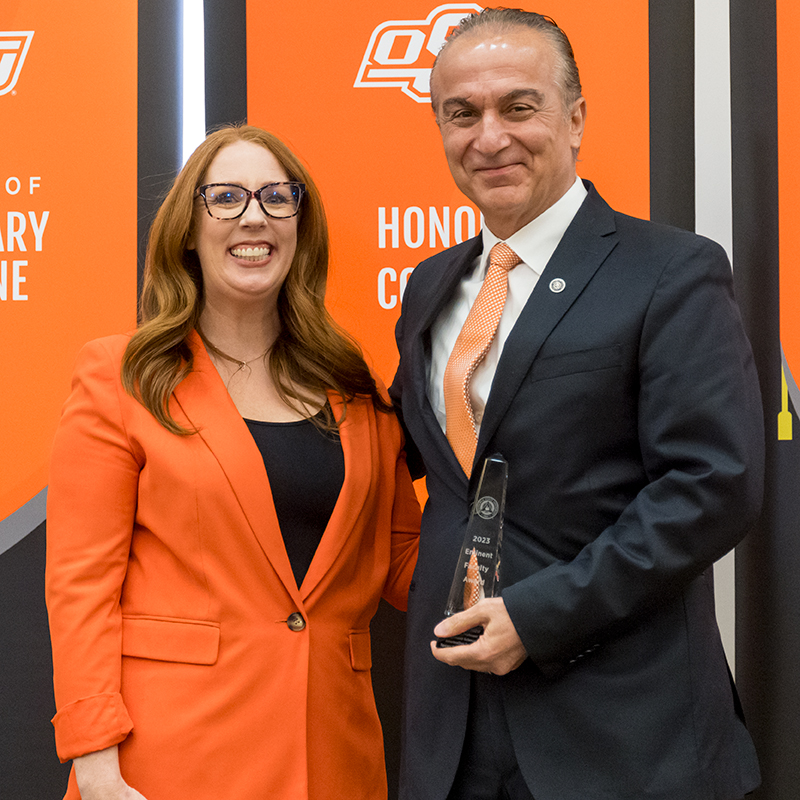
The healing power of data: Delen dedicates career to impactful data science research
Friday, June 21, 2024
Media Contact: Terry Tush | Director, Marketing and Communications | 405-744-2703 | terry.tush@okstate.edu
Growing up in Turkey, Dr. Dursun Delen always viewed things through an analytical lens. Little did he know the journey that analytical mindset would take him on throughout his life.
“From birth, you could say, I’ve always looked at things in a very analytical, systematic way,” Delen said. “I’ve always been very left-brain dominant, and always looked for the most efficient and effective ways to do anything, from conducting research to everyday life processes.”
When it came time to pursue university education, there was only one choice for Delen: industrial engineering.
“If you could summarize industrial engineering in one word, it would be optimization,” Delen said. “So, when choosing a degree path, it was easy. Industrial engineering was basically going to school to further develop the way my brain already functioned, doing more with less. Whatever you’re doing, do the best at it. Industrial engineering was always my focus through all three of my degrees and I never once thought that I should shift to some other course of study.”
The career data scientist received his undergraduate and master’s degrees in Istanbul, at Istanbul Technical University and Yildiz Technical University, respectively. After graduating with his master’s, Delen enlisted in the Turkish military, a requirement for their citizens.
However, while conducting his military service, Delen decided that he wanted to further his education with a doctorate in industrial engineering. He decided that if he was going to take the time and effort to earn a doctorate, he should do so from the best place possible. So, he began researching top industrial engineering programs around the world and found one that was far above the rest for his area of interest.
“People always ask, ‘Why didn’t you go to England or Germany for your doctorate?’” Delen said. “There are great schools all around the world, but for me, when doing the research on the right university to attend, it wasn’t just about the overall school rankings, it was about finding the right faculty members that would become my mentors. When taking that into consideration, there was only one place that made the most sense to me.”

At the time, the OSU School of Industrial Engineering and Management had three world-renowned faculty members in their respective fields, including Dr. Joe Mize in the field of modeling and simulation — an area that was of extreme interest to the Turkish academic.
So, after finishing his military service, Delen packed up his life and moved halfway across the world to Stillwater, Oklahoma, to work toward a doctorate in industrial engineering. A transition that would be daunting to some, Delen saw it as the most logical choice.
“At first, the transition to the U.S. was a little difficult,” Delen said. “The culture is drastically different than in Turkey, but mostly for the better. The U.S. is very structured, organized, systematic. When you do something, you know what you’re going to get at the end, there is less uncertainty in the system. That’s what really enticed me to the U.S. The more you work, the more you get.”
Delen completed his doctorate in 1996 and went to work in industry. He started at Knowledge Based Systems Inc., a research and consultancy company in Texas, as a research scientist. The company operated mostly with government agencies on efficiency and effectiveness research. During his five years with the firm, Delen worked on projects that ranged from strategic missile defense for the Department of Defense to space transportation systems for NASA. Every project Delen was involved in carried a data analytics and data science component. It would be a theme that would carry through the rest of his career.
“It’s funny,” he said. “I came to the U.S. to get a doctorate and I always thought that I’d go back to Turkey. Then, while working on my doctorate, I decided that getting a few years of industry experience would ultimately help me get a better job once I returned to Turkey, and that turned into five years.
“Right as I was beginning to think it was time to go back, someone asked, ‘Wouldn’t it be a good idea to get some experience in academia as well, to help with job opportunities in Turkey?’ So, I decided to delve into academia, and that was 23 years ago.”
In 2001, Delen returned to OSU as an assistant professor of management science and information systems at the Spears School of Business. Delen’s early career focused on taking the principles of engineering and applying those using data science to develop systems and procedures to optimize processes in business situations. Some of his early research projects that made him a sought-out expert focused on the prediction of Hollywood movies’ financial success before their production, the determination of the primary factor that led to severe injuries and fatalities in automobile crashes, and predicting and explaining the reasons behind freshmen student attrition in college settings, among other areas/topics. However, the Regents Professor was quickly drawn to applications of data science in the health care industry.
“The transition was something that happened pretty organically,” Delen said. “I worked on a couple of smaller projects with other faculty members and realized the impact that data science could have on the health care industry. From there, I was hooked. It seemed logical to me that if I got to choose areas of research, why wouldn’t I dedicate the time and effort to research that could be meaningful and impactful far beyond the publishing of papers.”
As a junior faculty member, Delen conducted a research project on the use of artificial intelligence and machine learning to investigate hundreds of thousands of unique patient records to determine if there was any underlying correlation between certain aspects of a cancer patient’s care and better survival chances.
Delen used the concepts of data analytics and data science to find possible correlations so that doctors, nurses and other health care professionals could then reevaluate the health care regimen from different perspectives that those professionals may not have considered otherwise. The paper Delen published became one of the seminal papers in cancer treatment, being cited over 1,600 times since its publishing.
Another project Delen recalls being impactful was a consultancy with a small company in Tulsa to reevaluate the organ transplant system. Too often, viable organs were discarded because the system wasn’t efficient enough to match organs and recipients in time.
Delen and his team used data mining and predictive modeling to create concrete data that would then be integrated into a simulation of the entire organ transplant process instead of using expert opinion on the determination of an organ-recipient match. From there, the team retrospectively investigated data from a past, set timeframe and found that had their data mining and predictive modeling system been used in the organ transplant system, they would have likely saved between 10-20% more lives.
“That’s what I’ve grown to love,” Delen said. “Doing meaningful research to help provide possible solutions to real-world problems in health care. I feel like the research I do on a day-to-day basis could possibly make a huge impact on someone’s life. Why would I devote my energy to anything else?”
The holder of the William S. Spears Endowed Chair in Business Administration and Patterson Family Endowed Chair in Business Analytics embraced that love of health care analytics and data science and helped found the Center for Health Systems Innovation (CHSI), which is located in both Tulsa and Stillwater.
CHSI is uniquely positioned at the intersection of the Spears School of Business and the OSU Center for Health Sciences, which allows the center to focus on both business and clinical innovations. As director of research for CHSI, Delen can continue to conduct impactful research on a myriad of health care related problems.
Recently, Delen was awarded a $1.7 million grant from the DoD to conduct groundbreaking data science research to discover if there’s a correlation between military personnel that have suffered traumatic brain injuries and those who later developed epilepsy.
“This is the largest scale academic research endeavor I’ve undertaken as a principal investigator since joining OSU over 20 years ago,” Delen said. “We hope to make a direct and meaningful impact on the identification and treatment of these patients.”
Delen continues to find new areas of research in the health care industry and make impacts that will be felt for years to come. During his career, Delen has written over 200 peer-reviewed and published articles that have been cited nearly 30,000 times. He has mentored countless data scientists who have gone on to continue conducting meaningful research and become mentors of their own. Delen recalled wanting to live up to his mentor’s level of impactful work and it seems like he has accomplished that and then some.

At the 2023 OSU Awards Convocation, Delen was the recipient of the Eminent Faculty Award, the highest honor given to a faculty member who has made sustained contributions to scholarly creative activity, instruction and service, bringing honor and recognition to the university.
“I was ecstatic when I was chosen for the Eminent Faculty Award,” Delen said. “I feel lucky, because we have so many amazing faculty here at OSU, renowned researchers and people that hold dozens of patents. To be in the same conversation as those people is truly an honor. I love OSU and I love what I do, and it truly reflects in productivity over time.”
Reflecting over his decades of experiences and the international appearances to conduct seminars or give talks to current and future data scientists, Delen provides a simple answer to what he wants his legacy to be.
“I want to be remembered as a data scientist for the difficult medical and health care problems,” Delen said. “Someone who does research to make a difference. I believe when you combine engineering and business together, with a little bit of real-world experience as a consultant, you have a totally different framework for what research is and should be.”
Story by: Jeff Hopper | Engage@Spears magazine
Photos by: Phil Shockley, Gary Lawson and provided
